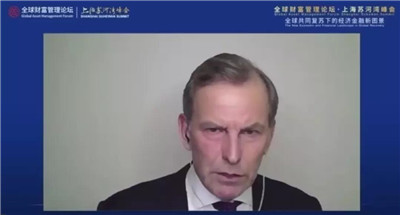保诚集团执行总裁:以时间换空间,用普惠服务拉动金融消费需求

保诚集团执行总裁韦立思先生(Michael Wells)近日出席全球财富管理论坛上海苏河湾峰会时,就全球化背景下的金融及保险业发展进行演讲。
韦立思先生介绍到,作为拥有174年历史积淀的老牌保险机构,保诚集团在过去几年迅速将其业务重点从发达经济体陆续撤出,积极部署以亚洲、非洲为主的新兴经济体,尤其看好中国市场,并在展业方面采取了切实有效的行动。韦立思先生谈到,市场虽然存在地理差异,但经济周期有章可循,“以时间换空间”,可以将一些过往经验再次应用于新兴市场。关于监管,韦立思先生倡导各国监管部门立足全球视角,形成一个高效且适应全球市场变化的统一规则,以利跨国机构的发展并造福全球消费者。消费方面,韦立思先生提出,目前全球各地消费者越来越关注健康、教育及养老三个方面的保障,如果加之科技赋能,这些领域对保险业将是一大机遇,也是金融机构落实普惠服务的契机。最后,韦立思先生指出,在全球化不断深化的今天,需要为居民储蓄进行全球投资创造条件,以利金融业在未来更好地创造价值。
以下为演讲全文。

我今天谈一下对金融及保险业未来的发展与展望。我先介绍一下,保诚集团诞生于1848年的英国,是一家拥有174年历史的老牌保险公司。我们的合资公司在中国取得了很大成功,受到市场高度认可,我们的业务覆盖了近75%的中国人口。中信集团是我们在中国的合作伙伴,我们在2020年合资成立了中信保诚资产管理有限责任公司。我们旗下还有瀚亚投资,它是一家独立的外商独资企业(WFOE)。
我们在中国的业务很成功,增长速度足以与行业水平媲美,但作为外国公司,我们在中国的业务规模仍然较小。过去几年,我们还剥离了英国业务,分别是M&G资产管理公司、保诚人寿以及美国的退休业务,杰克逊国民人寿。我们致力于成为一家完全专注于亚洲和非洲的保险公司,并跻身该领域最大的泛区域保险公司。以上是基于我供职于保诚二十六年来的一些背景介绍。
关于行业的未来展望,我想谈几点看法。正如我刚才所说,我认为聚焦很重要。真正的全球性企业集团所扮演的角色比过去复杂得多。历史留给我们的财富便是经验。企业在不同的市场开展业务,处于不同的发展阶段,因此,从美国和欧洲的多次危机中汲取了经验,这些经验也可以应用在新兴市场作为参考。我们也可以看到亚洲新兴市场的发展,寻找非洲发展中市场的相似之处,然后把得到的经验推而广之。我认为,这仍然是非常可行的做法。但我们知道,在当前的环境下,当务之急,是要将过往的市场经验、市场覆盖率与目前对本土人才、本土文化、本土消费者、监管机构和各种利益相关者间细微差别的理解这个问题上取得平衡。我认为,按企业过去的业务模式,将很难理解并适应现在由消费者需求驱动而瞬息万变的市场。
监管机构已经变得更加全球化,而且在全球化方面也变得更加高效。很大程度上,如果监管机构可以在全球范围内共享各自的经验则将再好不过。如此一来,通过汲取跨区域的监管经验,将使全球化监管变得真正高效。另外,全球消费者的消费水平和需求逐渐趋同,尤其是身处新冠疫情之中,老百姓们都担心健康问题,担心子女的教育问题,担心没有足够的钱养老的问题。在这些市场中,真正存在差别的是消费者选择怎样的路径,或者说选择怎样的工具实现目标。
中国也不例外。中国的经济增速是独一无二的。我有缘在中国营商二十六载,中国的发展之路非同寻常,中国选择的道路在社会和文化层面将影响到健康、教育和退休保障。现在,这些发展趋势已经发生了巨大的变化。有朋友问我,独生子女政策对退休保障有何深远影响?我想影响是巨大的。对于收入、教育、医疗保健的发展和中国政府养老保险支柱发展的影响都是巨大的,对中国自汉朝就出现的养老保障传统的影响也是巨大的。所以,存在一个平衡的问题。再看西方发达经济体。由于西方国家人口出生率较低,所以他们的医疗和退休计划由联邦或政府出资。西方面临的挑战是,随着中老年人口开始超过适龄劳动人口,是否有足够的适龄劳动力为这种养老模式买单?
其次,消费者的需求是相似的,但实现路径各不相同。我认为,我们的从业经验可以应用到很多市场。现在摆在我们面前的工具也是独一无二的,因为在我职业生涯的每一天都见证着金融服务的日趋成熟。上一位发言者谈到了保险。就资本积累和资金来源而言,保险公司应该是市场的长期参与者,银行是短期参与者,资产管理公司是中期参与者。如果确实如此,消费者就会形成一个良性循环,在长达二十多年的投资周期内,将教育、退休储蓄和医疗计划委托给保险机构进行管理。这样一来,这些资金也能够在长期内再投资到这些市场,而且不会与其他实体行业产生竞争。这并不意味着拥有长期眼光、长投资周期、长期资金供应保证的公司不需要拥有和那些中短期资金端公司一样的技术、规模、成本和效益。我举个例子,数字银行在全球大多数市场效果都很好,它们使年轻的消费者得以使用银行业务,使没有银行账户的人们得以享受金融服务,这都创造了巨大的社会价值。同样的情况发生也在保险业。在亚洲,我们的Pulse医疗生态系统应用程序有近三千多万次下载,很快就会进入非洲市场。数字技术的计费能力允许保险公司进行产品细分或开发 “微产品”,这是全球金融包容性的关键要素,也是每个国家内部金融包容性的关键要素。因为较年轻或收入较低的家庭也能得到与中产阶级、较高净值和高净值家庭所享受的类似产品与服务。
我认为,整个行业的发展趋势背后有两个关键驱动因素:一是细分化,原本面向高净值消费者的产品,现在惠及到了所有人;二是数字化,形成无纸化服务,不但高效省时,还满足了监管部门的各项监管。刚才,与会嘉宾们谈到了信息不对称的问题。鉴于一些金融工具十分新颖,消费者面临越来越多的共同基金、保险公司的产品,出现了选择困难,需要消费者作出的投资决策越来越多,可用手段琳琅满目。加大数字化工具的应用,让诸如金融中介、银行客户经理等传统的咨询建议提供者更好地服务于消费者。
所以我认为,那些具备高净值属性产品的逐渐普及将成为一个趋势,就如同曾经共同基金的创立带动了机构化资产管理风潮那样。
拿保险业来说,保诚在十九世纪的英国起步时,还是一家小额保险公司,旨在为英国的工薪阶层提供储蓄渠道。当时,保诚甚至开发了一款会计“软件”,可以用半便士为单位来计算保单金额。这种“软件”可以让在英国从事低收入工作的人们为退休进行储蓄。当他们退休后,在保诚的保险积蓄就转化为养老金。这可是发生在170多年前的事情,难以置信吧?我们目前在印度尼西亚提供非常便宜的数字化康养保险,在非洲通过电话急速购险服务提供寿险和储蓄服务等产品。这些产品的技术都不复杂,但却让数百万客户从中获益。在把越来越多的消费者纳入普惠金融和普惠医疗范畴这一进程中,保险业将发挥越来越重要的作用。
最后一个趋势是全球化。我在职业生涯期间,有幸走访了许多国家。在我了解的市场中,消费者们都有自己对特定产品和品牌的偏好,但这些产品和品牌可能并非来自本土,或者他们根本不知道这些产品和品牌来自哪里。这是一个普遍趋势。消费者的需求是全球性的,这意味着当我们谈论全球通胀时,我们其实是在谈论如何维持消费者的购买力。仅简单地靠拉动国内GDP和控制国内通胀是无法回答这个问题的。这个问题的核心在于,要把格局打开,着眼全球标准。如果可以帮助消费者用部分储蓄进行全球投资,金融机构就能实现全球市场的覆盖,拥抱全球市场的互联互通并产生全球标准,从而将储蓄的未来价值与将来可能购买的产品连接起来。
以上都是些比较基础的想法。总而言之,各国消费趋势正逐渐趋同。满足消费者需求的路径虽然迥异,但解决方案往往殊途同归。有了监管机构的支持,加之机构们的展业经验,利益相关方将迅速促成这一趋势的发展。我认为,短期内无论新冠病毒带来多么惨痛的后果,放眼长远,这不过是消费者们获得广泛普惠服务历程中的短暂插曲。

Speech at GAMF 2022
Shanghai Summit
Michael Wells
I am going to focus my comments if I could please on the future of the financial and insurance industry and the landscape as I see it. First for those that don't know us, Prudential is a 174 years old insurer, we originally started in the UK in 1848. We have a very successful and well rated joint venture, which covers about 75% of the Chinese population and regulatory footprint. Our partner in China is CITIC, together we started a joint venture as CITIC-Prudential Asset Management Company in 2020. And we have Eastspring, a standalone WFOE.
We have been a successful firm in China that continues to grow at a rate that competes with the industry very effectively, but as the foreign players do in China from a smaller base. What we have also done in the last few years is divested our UK businesses, M&G Asset Management, the original Prudential Life insurance, and in the US, the retirement business Jackson National Life. To become an Asia and Africa focused insurer completely and making us one of the largest pan-regional in this space. So just to give you a context of where my comments are coming from, that has been my experience, I have been with the firm for 26 years.
So, when I look at the industry going forward, I see a number of things. I think from the comments I just made, focus matters. The role of truly global conglomerates is much more complicated than it has been in the past. Historically what that model has brought was experience. You were on a market journey in different markets, in different levels of its development, so experience from multiple crisis from the US and Europe, and you could bring those to the emerging markets for example. Or you watch the emerging markets in Asia develop, and you look for similarities for developing markets in Africa, and you bring those learning across. I think this is still very doable, but the key now, in the current climate is the balance between that historic market experience, historic market presence, and local talent, local culture, local understanding of the nuances of the consumers, the regulators, and various stakeholders in markets. I don't believe the old expat model as it was, has the ability to understand the nuances, that comes mostly from the speed of change in the consumer.
Regulators have become more global, they have become more effective on that, there is very much a best practices model where the regulators globally share what they think is working. Their ability to absorb the historic lessons market across market is very efficient. The consumer level, the needs of the consumers that we see globally are very similar, they worry about health particularly in the midst of Covid, they worry about the education of their children, they worry about having enough money for their retirement. What is materially different, in each of these markets are the paths that those consumers take, or the journey that they have been on to get there.
China is no exception, the acceleration of growth in China has been unique, I have been fortunate to travel, and do business in China for 26 years, and it's an extraordinary path, and the dynamics that have moved on that will socially and culturally going to affect again health, education, and retirement, have changed massively. I have friends asking me the one child policy's impact on retirement culturally, it is material, so is the earnings and educations of those children. So is the development of the healthcare, and so is the development of some of the government pillars in China, again has retirement planning going back to the Han dynasty. So, there is a balance. In the developed markets in the west, you see a lower birth rate, so in some of those markets you have federal, and government funded health and retirement plans. Their challenge becomes, do you have enough young workers to fund that model, as the number of older people in the population starts to outweigh the younger workers?
The needs of the consumers are similar, but the journeys are different, the learning can be applied I think across a variety of markets. The tools we have in front of us now are also unique for this time. Because they are maturing of the best of what we learnt in financial services, certainly across my career. The earlier speaker talked about insurance, so in the capital stack, in the world of where money should come from, the insurer should be the long-term player, the bank should be short-term, the asset manager the intermediate, if that happens then there is a virtuous circle of consumers trusting us for 20 plus years in educational, retirement savings and health programs. And that has been able to invest back in those countries for a very long time, and not competing against the other entities in that space. It doesn't mean the firm with a long-term look, long-term investment cycle, long-term guarantee, doesn't need to have the same technology, same scale, and same cost and effectiveness as a player in the shorter end of that capital stream. Let me give you an example, digital banking has been very effective in most markets globally. And it has brought younger consumers to banks, and unbanked people into financial services, having tremendous social value. It also brought them into insurance, we have almost 30 million downloads into our Pulse health ecosystems, in Asia and soon now moving to Africa. The billability of digital technology, to allow us to fractionize or use another common term micro product, they are a key part of financial inclusion globally, and they are key part of financial inclusion inside each country. Because they allow younger, or a household with lower income to participate in very similar products and services to those household of middle class, higher net worth, and high net worth.
And the trend across the industry, I think there are a couple of key elements, it's more fractionalization, more making of products that were originally for higher net worth consumer, available to every consumer, more delivery without paper, digitally, which is more efficient and respects the time of the consumer, and still addresses the needs of the regulator to the company. The balance of information that a speaker earlier today talked about asymmetry. There are tools that are emerging, as there are more and more mutual funds, more and more insurance companies, more and more decisions for these consumers to make, there are also more tools to help them. The role of the traditional advice provider the agents, person in the bank lobby they are supported by much more digital and effective tools.
So, I think the trends you're going to see are fractionalization of what were high net worth products, again mutual funds started this fractionalization of institutional asset management.
In the case of insurance, we started in nineteenth century as a penny company in UK, giving the working person in the UK a chance to save, we even had an accounting software in the UK that measured policies in half pennies to allow people that worked in low-income roles in the United Kingdom to be able to save for retirement and knowing they had money with Prudential when they retired. It happened some 170 plus years ago if you can imagine that. We now have digital products that are very inexpensive, digitized health products in Indonesia, we have in Africa life insurance and savings products available on mobile minutes, again on technology that are fairly basic, and millions of clients benefits from this. And if the industry does its best, it brings more and more consumers into financial, and health inclusion, it could do both, its role will grow in importance.
The last trend is globalization, there is no consumer in any market I ever met, and I have been very fortunate to travel to a lot of countries in my career and current role, that doesn't have some products, some brands that they like, that's not manufactured there, or they don't know where it's manufactured. And that is a common trend. Consumer's needs are global, that means when we talk about inflation globally, we are also talking about protecting the buying power of the savings of the consumer. It can't be done through a single lens of domestic GDP, domestic inflation. How do you solve for that? You open-up your social-global standards, you get the scale of the global markets, you get the connectivity and standard of the global markets when you allow the consumer to invest globally with part of the savings, therefore tying their value of their future savings to similar items that they might purchase in the future.
So, these are fairly basic, I conclude by saying that I think there are nuance, but the trends for the consumers are very similar in every market we are in around the world. The paths are very different, and the solution tend to be very similar. The regulatory support, the learning, the stakeholders would suggest that these trends are going to accelerate over the very short-term, and I know however tragic Covid is, it will be a short part of the history of a broader and more inclusive health and savings experience for consumers. With that, thank you for your time, it's a pleasure joining you today.
全球财富管理论坛

全球财富管理论坛是在金融开放背景下,为顺应全球资产管理行业发展与中国资产管理行业转型需求,由清华大学经济管理学院、孙冶方经济科学基金会、中国财富管理50人论坛联合发起成立的一个国际性交流平台组织,论坛旨在构建一个汇聚全球资产拥有者和管理者、监管部门和市场代表的长期对话沟通平台,为国内外资产管理机构搭建交流与合作的桥梁。

